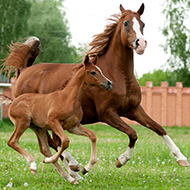Vets identify genetic cause of fatal condition in Thoroughbreds

EFIH is an invariably fatal condition that causes involuntary contraction of muscles and seizures in Thoroughbred foals.
A genetic cause of equine familial isolated hypoparathyroidism (EFIH) in Thoroughbreds has been identified by researchers at the UC Davis School of Veterinary Medicine.
Researchers say their finding, reported in PloS Genetics, marks the first genetic variant for hypoparathyroidism identified in any domestic animal species. It is also the first widely available genetic test for Thoroughbreds.
“For Thoroughbred owners and breeders, the loss of a foal has tremendous economic and emotional impacts,” says first author Victor Rivas. “It is important to promote safe and strategic breeding habits by actively breeding horses genetically screened not only for EFIH but for other diseases that may impact quality of life.”
EFIH is is an invariably fatal condition that causes involuntary contraction of muscles and seizures in Thoroughbred foals. Foals with the disease typically have low levels of parathyroid - a hormone that controls calcium levels - and often die or are euthanised owing to poor prognosis.
In the study, researchers identified an autosomal recessive mode of inheritance and performed whole-genome sequencing of two affected foals. They found that a mutation in the rap guanine nucleotide exchange factor 5 (RAPGEF5) gene was present in two copies in both foals.
The team further analysed the variant and demonstrated loss-of-function of the RAPGEF5 protein leading to aberrant development. Their study concludes that RAPGEF5 could play a key role in the derivation of the parathyroid gland during development.
“The next steps are to assess the allele frequency in a large population of randomly selected Thoroughbreds,” explained study lead Dr Carrie Finno. “Additionally, we have discussed collaborating with Dr Nathan Slovis at Hagyard Equine Medical Institute in Kentucky to test for the variant in cases of ‘sudden death’ in Thoroughbred foals.”



 Joanne Webster, a professor of parasitic diseases at the RVC, has been elected as a Fellow of the Royal Society (FRS).
Joanne Webster, a professor of parasitic diseases at the RVC, has been elected as a Fellow of the Royal Society (FRS).